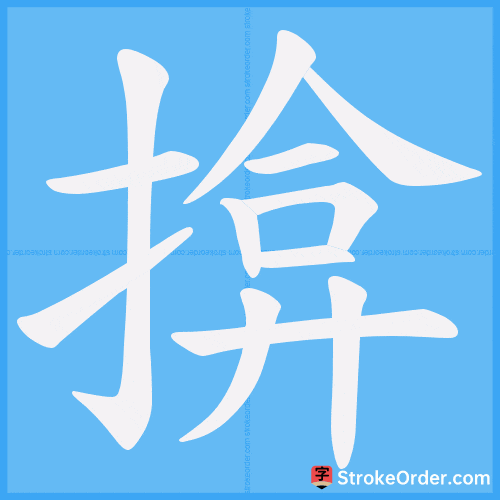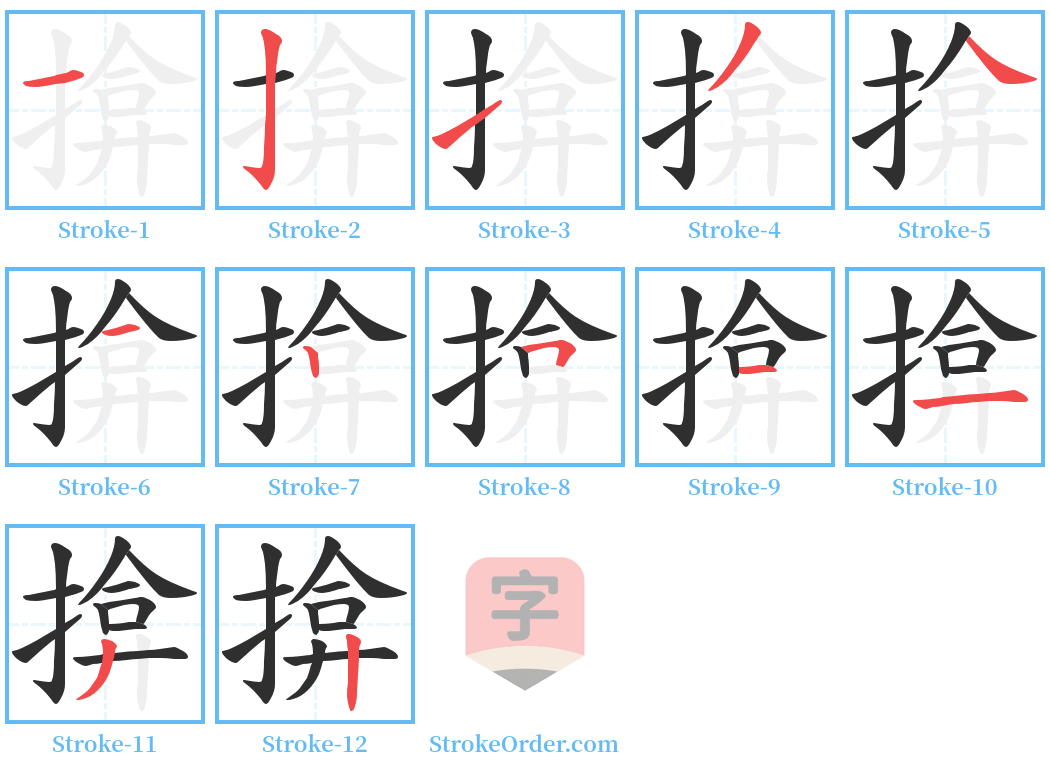揜 Stroke Order
Animated Stroke Order of 揜

Stroke Order Diagrams for 揜

Information of 揜
Pinyin
yǎn
Radical
扌
Strokes
12 strokes
Usage
★★
Definition
揜 [yǎn]
1. 同“掩”。
Same as "掩".
2. 捕取;袭取 ([En.] take)
To catch; to seize.
3. 遮蔽;掩藏 ([En.] cover; hide)
To cover; to hide.
4. 承袭 ([En.] inherit)
To inherit.
5. 通“掩”。夺去 ([En.] seize; take by force)
Same as "掩". To seize; to take by force.
引:
1. 《说文》:揜,自关以东,取曰揜,一曰覆也。
(Shuowen): "揜" refers to a place east of Guan, also meaning to cover.
2. 《礼记·王制》:诸侯不揜群。
(Book of Rites): The feudal lords do not seize the masses.
3. 《谷梁传·昭公八年》:揜禽旅。
(Guliang Zhuan): To catch the birds coming in.
4. 《史记·司马相如传》:揜群雅。
(Records of the Grand Historian): To seize a collective of elegance.
5. 汉·刘向《说苑·修文》:取之不围泽,不揜群。
(Han Dynasty): Take from without enclosing the marsh, do not seize the masses.
例:
又如:揜群(捕取兽群)
For example: "揜群" means to catch a group of animals.
引:
1. 《礼记·檀弓》:广轮揜坎。
(Book of Rites): The broad wheel covers the pit.
2. 《荀子·富国》:出入相揜。
(Xunzi): Coming and going are covered.
3. 《二刻拍案惊奇》:忽见一个人揜揜缩缩,在那瓜地中。
(Anecdotes from the Second Edition): Suddenly saw a person hiding and squatting in the melon field.
例:
又如:揜覆(遮盖);揜著(掩饰自己的坏处,显示自己的好处);揜眼(眼罩);揜匿(遮掩)
For example: "揜覆" means to cover; "揜著" means to hide one's shortcomings while showing one's strengths; "揜眼" means an eye mask; "揜匿" means to conceal.
引:
1. 《荀子·儒效》:教诲开导成王,使谕于道,而能揜迹于文武。
(Xunzi): To educate and guide the King Cheng, to explain the way, and to inherit the traces of Wen and Wu.
例:
又如:揜迹(承袭先辈的事业)
For example: "揜迹" means to inherit the career of predecessors.
引:
1. 《淮南子·泛论》:见寝石,以为虎也。惧揜其气也。
(Huainanzi): Seeing sleeping stones, thinking they are tigers. Fear arises from seizing its energy.